Christian-History.org does not receive any personally identifiable information from the search bar below.
Christian Story: Much Like El
I wrote this Christian story about 10 years ago after a Bible study we attended. The illustrations are by Jeremiah Briggs.
Ad:
Our books consistently maintain 4-star and better ratings despite the occasional 1- and 2-star ratings from people angry because we have no respect for sacred cows.
I could see the sun shining over the horizon as I crested the hill. It was a glorious spring morning. Before me lay a valley of unspeakable beauty, especially for one such as I, who had never seen the spring. Lush green fields lay folded and rippled across the hills of this land, rolling over the hills from one patch of man-shaded green to the next. Animals grazed in the fields, which were crossed here and there by small, babbling brooks and flowing creeks.
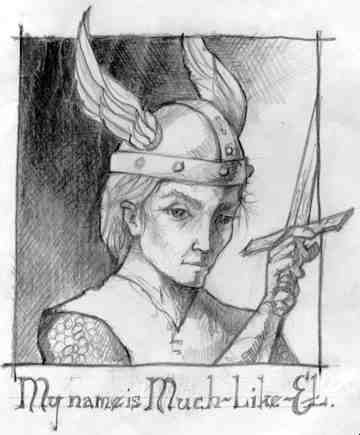 "My name is Much-Like-El"
"My name is Much-Like-El"Across one creek, about halfway across the valley, was a house. It was big and white and it led my eye to others half-hidden in the trees. Children played by the creek and amidst the hustle and bustle of farm life I could make out women going about their chores as the sound of hammers pounding nails rang out all the way to my hilltop perch.
This was it! It was my near neighbor, and I had never even known it existed. Tears of relief and thanksgiving began to flow down my cheeks. "I can't believe I'm here!"
My name is Much Like El. I'm sure my parents didn't think much of it when they named me that. No one ever seemed to think El cared much about such things where I'm from. I never did, either, although after the incidents of this story, I am very hesitant about even telling people my name. I'm learning he cares about a lot of things I didn't think he cared about.
I live in a barren world, full of rocks and very little vegetation. It's never spring here, but it's really never any other season, either. It's just dingy and dark. The ground is always brown, and the sky is always gray.
It wasn't always that way. We were swept across by a huge army that devoured everything in its path. It wasn't an earthly army, because not only did they conquer us, but they conquered the land and sky as well. They were gone now, but the effects of their reign were as apparent as ever.
We told stories of when they came. We remembered mighty men who gave their lives in defending the land. Men who could wield a sword with astonishing speed and accuracy. Others who by their might and strength put whole battalions to flight. But the enemy was patient, well-armed and well-stocked with men. Their armies kept coming and coming until there were very few mighty men to deliver the people from the invaders. Now the mighty men were only legends; stories that grandfathers told to their grandchildren.
Oh, we have our men here and there. They're not quite like the men of old, I am told, because food is so scarce here. But now and again, you will see a man who can wield weapons, and who is not so anemic and frail as men are now. Such men have risked their lives leaving the safety of community in order to find better fare than our cities offer. Many who do so die. And of the ones who survive, most come back fat and drunken, no more a warrior than any of the starving of our cities. It is only a rare one who somewhere out there both learns the craft of war and finds enough food to be strong for war.
That's why it was such a shock when those men came in. I ran a school for swordsmanship. It's not like I was actually making warriors. There was not enough food for that. But I really thought I was training them to use their swords, if some day it actually rained—rather than just threatening to—and we could grow food for nourishment. In fact, I had carefully read the books and was studying at a school for instructors.
They came in with some of my own students. There were six of them. They were very friendly, as Feaster had told me they were. Feaster is one of my students. We call him that because he loved food and longed so much to be able to feast. In fact, he made a feast out of all the food that came his way, distinguishing between the man-made tablets that kept most of us alive and the occasional piece of real food that was spread so thin among the inhabitants of the city. He would relish the tiniest such portion, gazing at it as though it were some prized jewel. Then, slowly and luxuriously, he would make an entire feast out of the smallest stem of broccoli or forkful of some stray animal, one occasional kill of which had to be spread over the whole city.
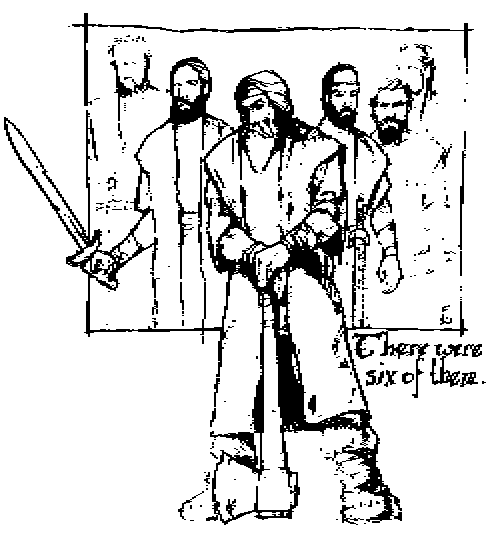 "There were six of them."
"There were six of them."Feaster had told me of the men, but I hadn't expected real outsiders. It was quite incredible, really. I could still make out the gaunt facial lines in most of them that said they were from the city, raised in anemia and poverty. But they had been eating food for a long time, it appeared, and they had filled out into real people. As I said, the city does not see many of those.
All of them were armed. The stoutest of them carried not a sword, but a battle ax. The swords of the rest of them varied. I looked at the uniform swords of my students—the only kind made in the city—and I realized these men had even found or made swords outside the city. That was very unusual.
I nervously set about getting the students in order. Most of our training and practice was in simple thrust and parry, and the men participated in my class quite cordially. My fear dissipated some, for while I knew the anemia of the city--and both my students and myself longed for the true food that would allow us to grow into warriors--I also knew that I was in the best line of swordsmanship instruction in the city.
The men joined the thrust and parry practice, and, while it was obviously simple to them, they didn't seem bored as much as anxious for further practice with the sword. I was happy with that and allowed the class to drift towards mock attack and defense situations. To say the least, it was an enlightening move.
Casually, as was my habit, being quite unused to actual warfare, I offered attacks to my students, asking for the best response to the attack. They would slowly illustrate their defense. Since the men were cooperating so well, I included them in this lesson. The one with the battle ax was first. Perhaps I should have expected something, because he used the heavy ax as though it were a sword, and turned it quite effortlessly, as one would a sword.
I stepped towards him and offered an overhead attack, and I am not quite sure I knew what happened next until it had already happened. I remember the sound of the ax as it swooshed next to my rib cage and the pause of the man when he saw my face turn white. I stood still in place for a second, my sword still raised overhead, and even he seemed a little uncomfortable. He apologized for frightening me, but I could only nod. Slowly I lowered my sword, lest I incur another reaction to my movement, and I walked waveringly back to my seat.
Clearly this was the time for discussion, not action, I thought. So we turned to discussing the use of the sword, when one of my students confessed his difficulty with even pursuing being a warrior. I went on with the discussion, not realizing that my student had drawn the attention of every one of those men. Finally, when the one with the battle ax could bear it no longer, he rose and pulled Peering to his feet. Peering was so called, because he seemed constantly to be searching for something, but not openly. As a result, while he could not give his whole body to the search, his eyes were constantly moving, roving, looking for something that would give meaning to his existence in the city.
The man with the battle ax said, "Swing your sword." Peering swung it in an arc, and it thudded dully as the man blocked the blow with the battle ax. "Harder," he commanded. Peering was a citizen of the city, and he was not any more well-fed than anyone else in the city, but something suddenly glowed in his eyes, and his sword seemed to flash with a life of its own. The next arc he cut in the air was swifter than anything I had ever seen except the flash of the battle ax just a few minutes earlier—a flash so fast I didn't see it, but only heard it.
Peering looked up, as astonished as I was myself. "There's a warrior inside of you, don't ever fight yourself. Let him fight," said the man.
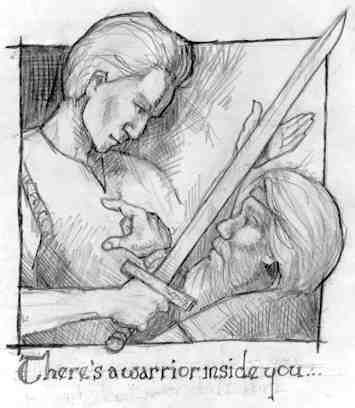 "There's a warrior inside you."
"There's a warrior inside you."I wasn't sure what to do next. What could I say, having seen that? Peering had been trained in the city for years and this man had produced more from him with a word than all his training put together. What now could I say with every eye turned not to me, but to this man with the ax?
I said nothing at all. One of the things that made our line of swordsmanship the best in the city was its acknowledgment of El. We planned our training, but we always made room for El to assist. If this was El assisting, then I needed to be open.
Another of the men arose, and I began to have an inkling of what was going on. He said that there was a great difference between training and actual battle and that the man with the ax was battle-trained, not school-trained. In fact, he said there was war now, the same kind of unearthly war that had conquered the land, but that this time El had an unearthly army that was taking the land back.
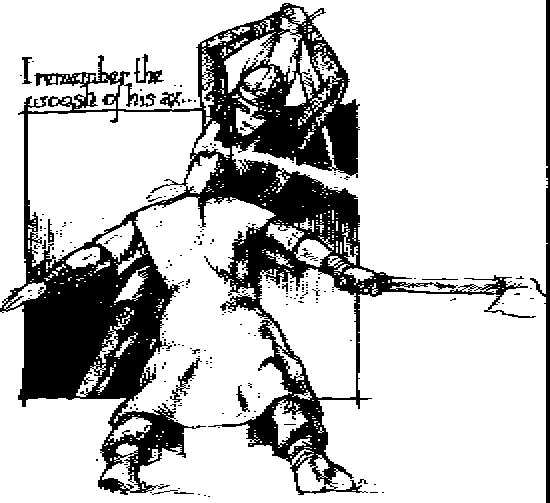 "I remember the whoosh of his ax..."
"I remember the whoosh of his ax..."He didn't seem to realize that we did not consider that possible. We all had been told that as the city grew, the seasons, and thus the food, would return. That an army might be gathered outside the city was a bit more than we were allowed to swallow.
But why he didn't know that became rapidly apparent. The man with the battle ax arose, and his words fell like thunder in our midst. He said the city actually had to rise up and do something to take the land back, or it would simply continue on in decay and darkness. This meant, he said, that every man had to risk his life leaving the comfort of the city in order to find food for the city and to learn the art of war.
My stomach began to churn within me. I knew of the necessity of war, and we were learning that, indeed, the city would need to rise up and hunt for food. but I had imagined that we would simply discuss it, and that with enough pressure and evidence, we of the city would together begin to move in the direction of obtaining food and beginning war. I had never considered that it was not okay to wait, nor that there might already be an army forming that I must join—outside the city at the risk of my life.
Yet, there were traditions handed down from the past concerning El's desires for this land, which was his. And these men left no room for argument, because they appealed to El's traditions. I was shaken, and I watched.
The man with the ax spoke on, and I could see that the hearts of many of my students were being inflamed. Fear seized me. It seemed like my whole world was crashing around me. I was being compelled to action, but it was the action of the foolish that called me. Most men perished in that way. I could see my instructors becoming my enemies as I rejected their plans and left the city on my own as so many had done before. It was all the worse as I could see that others would be willing to go with me. They made the whole prospect seem possible.
My head reeled, and I latched onto a shelf next to me to keep from falling. The man with the ax was still speaking to my students, but I could no longer make out his words. I knew he was still talking from the droning of his voice, but my attention was caught up in my fear and in trying to still the spinning of my thoughts.
Suddenly he was done. It was quiet, and I looked around at the varied faces. Some were curious that men could make such a case for leaving the city to almost certain death. Those were not the ones that scared me. It was the couple with the captivated look in their eye. They were caught in the web of this man's words, longing for the war, for adventure, and above all, for food.
Hurriedly I ended the class, which only caused the students to make a beeline for these men. A couple of the students left, but the rest were already around the warriors, listening, longing for the life they spoke of.
It wasn't that I couldn't understand. They said they had some of the land already and had seen the spring. Clearly they had eaten, and who would not long to be full? I resigned myself to not being able to stop the conversations, and I turned to the man with the ax. He spoke more to me, but now it didn't make much of a difference. The damage was already done within me, and I was already consigned to a decision I was terrified to make.
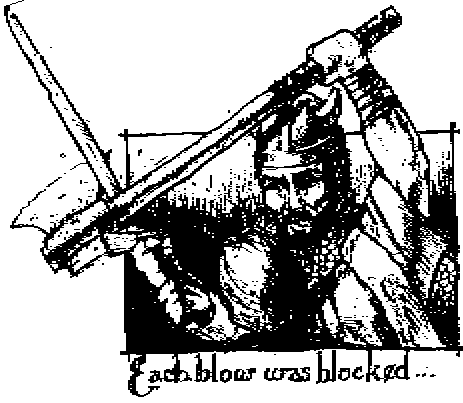 "Each blow was blocked."
"Each blow was blocked."It was then that Bull came in. Bull! I had forgotten about him, because he was not really one of my students. Bull had been outside the city, and we called him Bull, because he had actually eaten out there and was thus bigger than the rest of us. He could swing a sword hard enough to do damage, which was beyond the ability of most in the city. It was thus difficult for him to be under my instruction, because his size ensured that he would have no problem defeating me in combat.
He did come to my class occasionally, however, as he had hated the outside. Much hurt had come to him there, and he had found no friends. He was now resolved to stay in the city, so he was also resigned to being a part of the city's plan, which was slowly to train warriors—which, however, was never really successful, because there was not enough food to make them strong.
Bull went straight to the man with the battle ax. Having been outside the city, he had seen battle. Not the battle of a war, for he had always been alone, but the man to man battle that comes from the disunity and mistrust of outsiders. That battle experience, combined with the anger bred from disappointment, made him fearless this night.
Bull sat and talked quietly, but soon his sword was unsheathed, and he sat ready to fight. I stepped back. Fighting amongst the various schools and lines of swordsmanship happened all the time in the city, but in those fights the swordsmen were never strong enough to actualy hurt one another. But this was Bull, the strongest of us, with an outsider clearly strong enough to kill. However, if Bull could prevail, then I could be confident that there was hope in the city, and I would not need to leave it.
The man with the ax did not raise it. He sat unmoved by Bull's threatening sword. Rather than fight, he called Bull to join his army. Bull listened, unmoved by his words, until finally he could hear no more. He drew his sword back and struck. In an instant the man was to his feet, ax in hand, and the sword fell with a dull thud on its heavy wooden handle. The man swung the ax just hard enough to make Bull jump back, but Bull was on the offensive, and he did not stop. He put both hands on his sword and stepped forward to offer blow after successive blow.
Each blow was blocked, some with difficulty, some with ease, until finally the man with the ax returned the offensive. The ax was spun with amazing adeptness inches in front of Bull's eyes, and now he stepped back, not to withdraw his offense, but to reconsider it, lest he lose his head. But now, the battle started, the man with the ax refused to surrender his offense. Bull was startled at being pursued and jumped back far enough to regain his stand. However, at this point, he realized that he might have more than met his match and was a bit more willing to listen.
So the man talked again, and Bull listened. In fact, he soon slumped into a chair, and, despite all his bad experiences, I could see his longing for the adventure of life outside the city. My stomach knotted up again, and I just sat until they left.
What could I do? It wasn't my school. I was just the instructor. The very thought that their students were called to leave the city and fight for some other army was more than the owners could handle. How dare they! I had the audacity to mention El's traditions and the men's familiarity with them, but the owners called them deceivers and told me they were not to be back.
Not come back? How was I supposed to stop them? With my sword? Didn't they understand that despite all their lessons, I needed food?
I told Feaster to ask the men not to return, and I was a little surprised to learn that they willingly agreed not to.
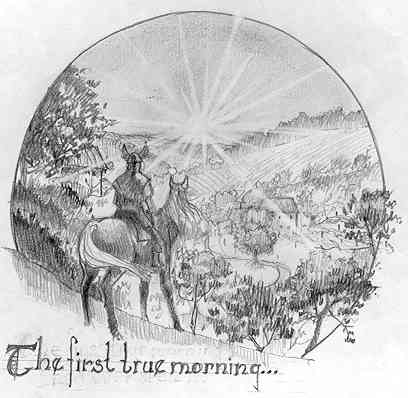 "The first true morning..."
"The first true morning..."Surely no one can fault me. What could I do? The words and life of the men weighed so heavily on me that there was nothing else I could do. I walked mournfully around for weeks, and finally said, "There is but one choice." I mounted my horse and set out for the Camp of Life.
No one came with me. It was not an easy choice. Even my family told me merely to let them know if it worked. Somehow, although I cannot claim to know anything of life outside the city, I begin to believe that not only is this the will of El for all men—this leaving of the city—but it must always be done alone.
So alone it was. There is not much to report yet, and it was not half so difficult as I had made it out to be. It was as nearby as the men said it was. I had pictured bands of thieves and perhaps even ghosts and goblins awaiting me outside the city. Instead, there was just more of our own barren landscape until that glorious morning—the first true morning I had ever seen—when I crested that hill.
Can you blame me? Leaving the city was slow, difficult … and there were many backward glances. But now I spurred my horse, sat up high in the saddle, and burst down the hill with all the speed that a hungry city steed could muster.
As for the future … well, that's another story.
Return to Christian Paintings by Jeremiah Briggs
Early Church History Newsletter
You will be notified of new articles, and I send teachings based on the pre-Nicene fathers intermittently.
When you sign up for my newsletter, your email address will not be shared. We will only use it to send you the newsletter.